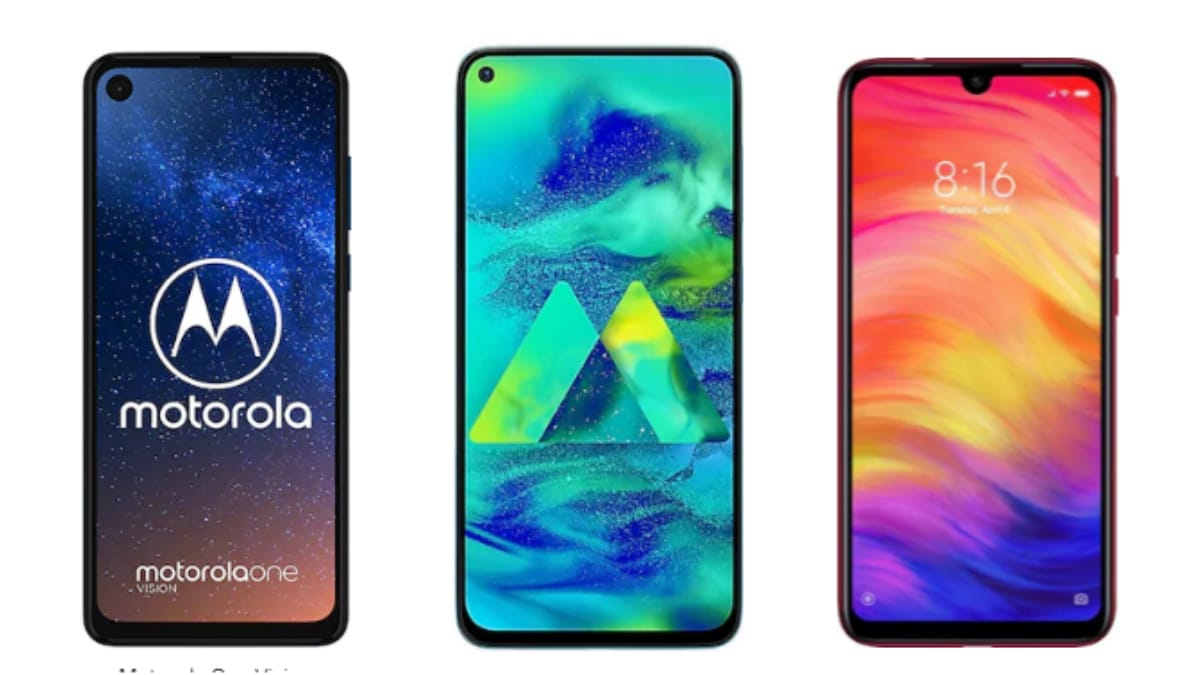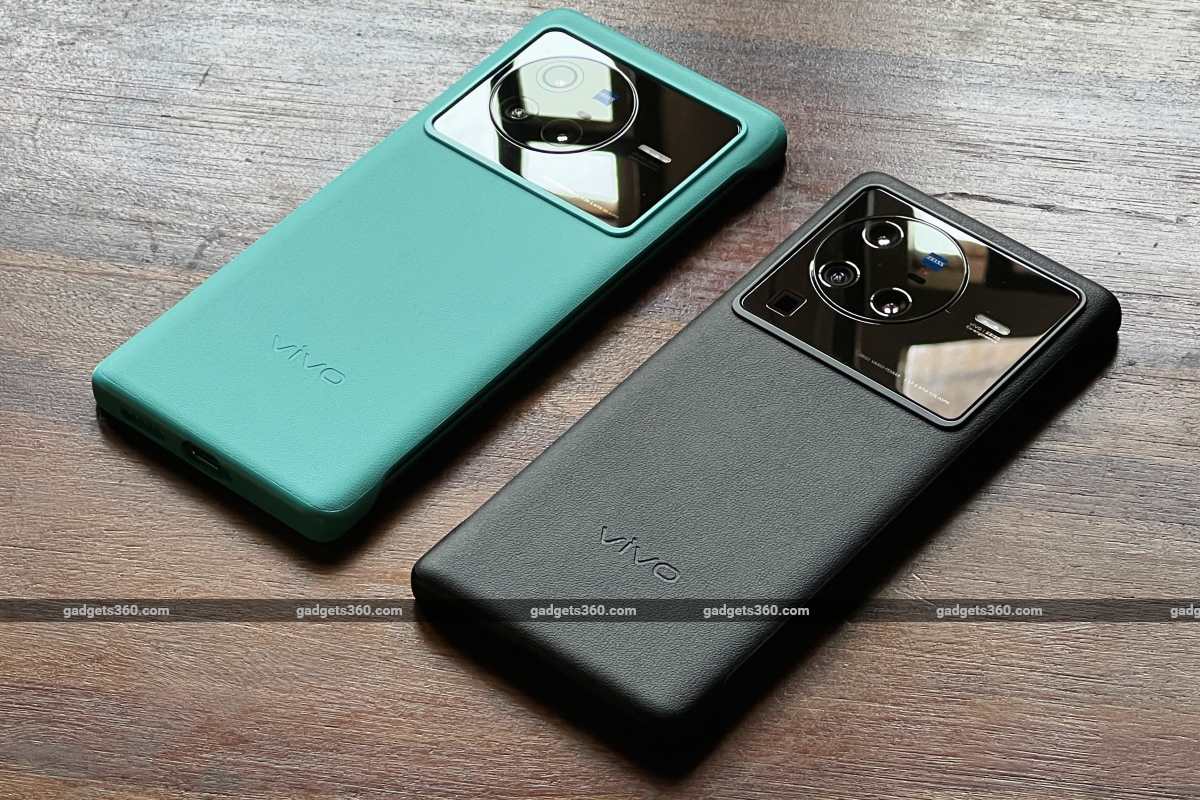Motorola One Vision was launched in India, and its price is set at Rs. 19,999. The phone will compete with the likes of other popular budget offerings like the Samsung Galaxy M40 and the Redmi Note 7 Pro. All three phones come with a 6.3-inch display and run on Android Pie. The Motorola One Vision has a few differences from its competitor and we highlight all of the differences down below.
We pit the Motorola One Vision against the Redmi Note 7 Pro and the Samsung Galaxy M40 to see which one fares better on paper.
Motorola One Vision vs Redmi Note 7 Pro vs Samsung Galaxy M40: Price compared
The Motorola One Vision price in India has been set at Rs. 19,999 for the 4GB + 128GB variant. The phone will go on sale from June 27 on Flipkart. It will be offered in Bronze Gradient and Sapphire Gradient colours. Launch offers in the first week (June 27 to July 4) include no-cost EMIs for 6 months on all credit and debit cards. Vodafone Idea subscribers get up to Rs. 3,750 cashback and additional data up to 250GB.
The Samsung Galaxy M40, on the other hand, is priced in India at Rs. 19,990, and the smartphone is available in a single 6GB + 128GB storage variant. The phone is available on Amazon India and Samsung Online Store. The smartphone is listed in Midnight Blue and Seawater Blue gradient colour options.
Lastly, the Redmi Note 7 Pro price in India starts at Rs. 13,999 for the base variant with 4GB of RAM, and 64GB of inbuilt storage. The top-end variant, with 6GB of RAM and 128GB of inbuilt storage, is priced at Rs. 16,999. The Redmi Note 7 Pro will go on sale via Flipkart and Mi.com, in Neptune Blue, Nebula Red, and Space Black colour variants.
Motorola One Vision vs Redmi Note 7 Pro vs Samsung Galaxy M40 specifications
All three phones sport a dual-SIM slot and run on Android Pie. While the Redmi Note 7 Pro and the Samsung Galaxy M40 have skins on top, the Motorola One Vision runs on stock Android. All the three phones feature a 6.3-inch display with full-HD+ (1080×2340 pixels) resolution. The Motorola One Vision has 21:9 aspect ratio, while the other two sport 19.5:9 aspect ratio. The Motorola and Samsung variant sport a hole-punch display while the Xiaomi variant has a waterdrop-style notch.
The Motorola One Vision is powered by the Exynos 9609 processor, while the other two are powered by the Qualcomm Snapdragon 675 processor. The Motorola One Vision maxes out at 4GB of RAM, while Samsung Galaxy M40 and Redmi Note 7 Pro offer up to 6GB of RAM options as well. All of them come with hybrid microSD card slots for memory expansion.
On the imaging front, the Motorola One Vision packs a dual rear camera setup, which houses a 48-megapixel primary sensor with f/1.7 lens with optical image stabilisation support. There is a 5-megapixel secondary sensor as well. For selfies, the company has included a 25-megapixel shooter on the front with an f/2.0 lens on the Motorola One Vision.
The Samsung Galaxy M40 also has a triple rear camera setup that houses a 32-megapixel primary sensor with f/1.7 lens, a 5-megapixel secondary, depth sensor, and an 8-megapixel sensor with an ultra-wide-angle lens. There is a 16-megapixel sensor at the front as well.
For photos and videos, the Redmi Note 7 Pro sports a dual rear camera setup that includes a 48-megapixel primary sensor with an f/1.79 lens and a 5-megapixel secondary depth sensor. There is also a 13-megapixel camera sensor at the front. The rear camera setup supports a list of artificial intelligence (AI) powered features, such as AI scene detection, AI Portrait 2.0, and a Night mode. It also offers 4K video recording.
The Redmi Note 7 Pro packs the largest battery at 4,000mah, while the Motorola One Vision and the Samsung Galaxy M40 pack a 3,500mAh battery. The Samsung Galaxy M40 is the lightest and thinnest at 155.3×73.9×7.9mm and 168 grams. The Motorola One Vision is the thickest measuring at 160.10×71.20×8.70mm and the Redmi Note 7 Pro is the heaviest weighing at 186 grams. The Samsung Galaxy M40 lacks a 3.5mm audio jack, while the Redmi Note 7 Pro and the Motorola One Vision come with a jack. All three phones support Bluetooth v5, a rear fingerprint sensor, and Face Unlock.
Vivo Z1 Pro, Redmi Note 7 Pro, Samsung Galaxy M40, or Realme 3 Pro: Which is the best phone under Rs. 20,000? We discussed this on Orbital, our weekly technology podcast, which you can subscribe to via Apple Podcasts or RSS, download the episode, or just hit the play button below.
Samsung Galaxy M40 vs Motorola One Vision vs Redmi Note 7 Pro comparison
|
|
|
|
|
| Ratings | |||
| Overall NDTV Rating | |||
| Design Rating | |||
| Display Rating | |||
| Software Rating | |||
| Performance Rating | |||
| Battery Life Rating | |||
| Camera Rating | |||
| Value for Money Rating | |||
| Key Specs | |||
| Display | 6.30-inch | 6.30-inch | 6.30-inch |
| Processor | Qualcomm Snapdragon 675 | Samsung Exynos 9609 | Qualcomm Snapdragon 675 |
| Front Camera | 16-megapixel | 25-megapixel | 13-megapixel |
| Rear Camera | 32-megapixel + 5-megapixel + 8-megapixel | 48-megapixel + 5-megapixel | 48-megapixel + 5-megapixel |
| RAM | 6GB | 4GB | 4GB |
| Storage | 128GB | 128GB | 64GB |
| Battery Capacity | 3500mAh | 3500mAh | 4000mAh |
| OS | Android 9 Pie | Android 9 Pie | Android Pie |
| Resolution | 1080×2340 pixels | 1080×2520 pixels | 1080×2340 pixels |
| GENERAL | |||
| Brand | Samsung | Motorola | Xiaomi |
| Model | Galaxy M40 | One Vision | Redmi Note 7 Pro |
| Release date | June 11, 2019 | May 15, 2019 | February 1, 2019 |
| Launched in India | Yes | Yes | Yes |
| Body type | Plastic | Glass | Glass |
| Dimensions (mm) | 155.30 x 73.90 x 7.90 | 160.10 x 71.20 x 8.70 | 159.21 x 75.21 x 8.10 |
| Weight (g) | 168.00 | 180.00 | 186.00 |
| Battery capacity (mAh) | 3500 | 3500 | 4000 |
| Removable battery | No | – | No |
| Fast charging | Proprietary | Proprietary | Quick Charge 4+ |
| Colours | Midnight Blue, Seawater Blue, Cocktail Orange | Brown Gradient, Sapphire Gradient | Classic Space Black, Nebula Red, Neptune Blue |
| DISPLAY | |||
| Screen size (inches) | 6.30 | 6.30 | 6.30 |
| Resolution | 1080×2340 pixels | 1080×2520 pixels | 1080×2340 pixels |
| Protection type | Gorilla Glass | – | Gorilla Glass |
| Aspect ratio | 19.5:9 | 21:9 | 19.5:9 |
| Pixels per inch (PPI) | – | 432 | 409 |
| HARDWARE | |||
| Processor | 2GHz octa-core (8x2GHz) | 2.2GHz octa-core | 2GHz octa-core |
| Processor make | Qualcomm Snapdragon 675 | Samsung Exynos 9609 | Qualcomm Snapdragon 675 |
| RAM | 6GB | 4GB | 4GB |
| Internal storage | 128GB | 128GB | 64GB |
| Expandable storage | Yes | Yes | Yes |
| Expandable storage type | microSD | microSD | microSD |
| Expandable storage up to (GB) | 512 | 512 | – |
| Dedicated microSD slot | No | – | – |
| CAMERA | |||
| Rear camera | 32-megapixel (f/1.7) + 5-megapixel + 8-megapixel | 48-megapixel (f/1.7, 1.6-micron) + 5-megapixel (f/2.2) | 48-megapixel (f/1.79, 1.6-micron) + 5-megapixel |
| Rear autofocus | Yes | Yes | Yes |
| Rear flash | LED | Dual LED | LED |
| Front camera | 16-megapixel | 25-megapixel (f/2.0, 1.8-micron) | 13-megapixel |
| SOFTWARE | |||
| Operating system | Android 9 Pie | Android 9 Pie | Android Pie |
| Skin | OneUI | – | MIUI 10 |
| CONNECTIVITY | |||
| Wi-Fi standards supported | 802.11 b/g/n/ac | 802.11 a/b/g/n | 802.11 a/b/g/n/ac |
| Bluetooth | Yes, v 5.00 | Yes, v 5.00 | Yes, v 5.00 |
| NFC | Yes | Yes | – |
| USB OTG | Yes | – | Yes |
| USB Type-C | Yes | Yes | Yes |
| Number of SIMs | 2 | 2 | 2 |
| Active 4G on both SIM cards | Yes | – | Yes |
| SIM 1 | |||
| SIM Type | Nano-SIM | Nano-SIM | Nano-SIM |
| 4G/ LTE | Yes | Yes | Yes |
| SIM 2 | |||
| SIM Type | Nano-SIM | Nano-SIM | Nano-SIM |
| 4G/ LTE | Yes | Yes | Yes |
| SENSORS | |||
| Face unlock | Yes | Yes | Yes |
| Fingerprint sensor | Yes | Yes | Yes |
| Proximity sensor | Yes | Yes | Yes |
| Accelerometer | Yes | Yes | Yes |
| Ambient light sensor | Yes | Yes | Yes |
| Gyroscope | Yes | Yes | Yes |
| Compass/ Magnetometer | – | Yes | Yes |



